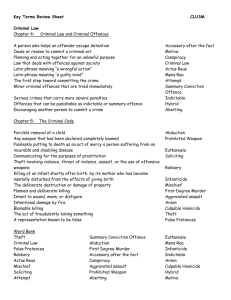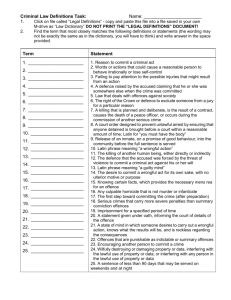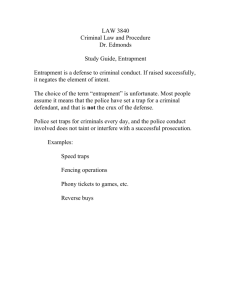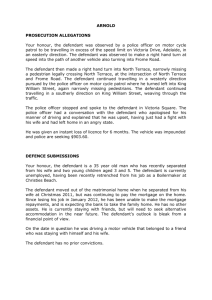curzon_6e_update_Mar04
advertisement
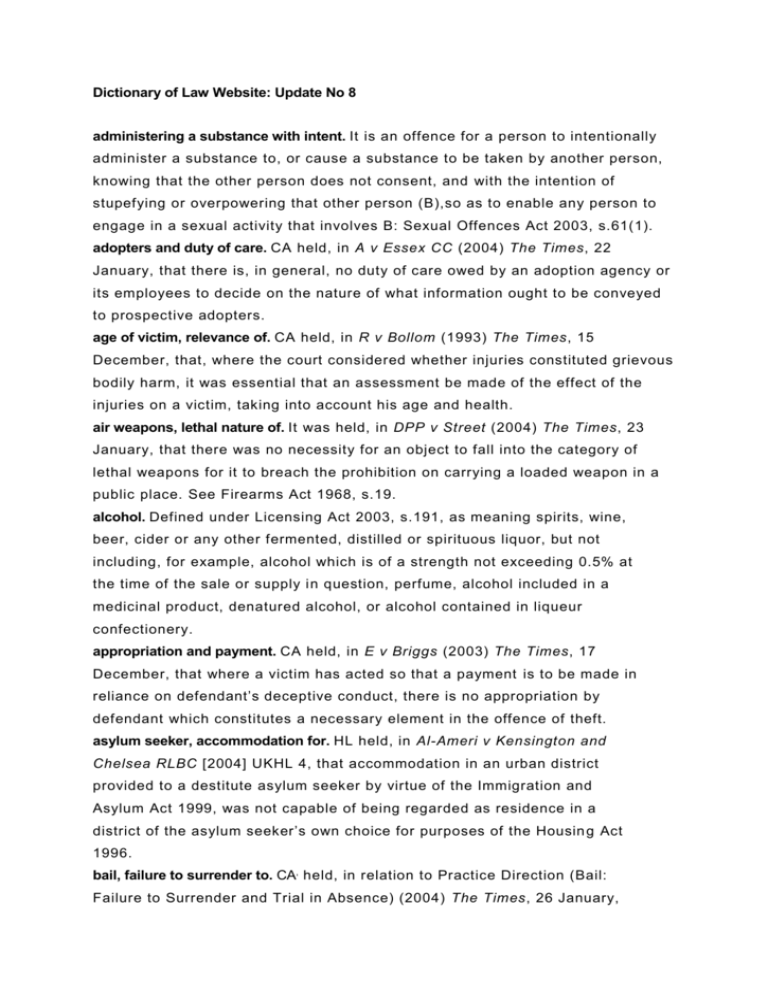
Dictionary of Law Website: Update No 8 administering a substance with intent. It is an offence for a person to intentionally administer a substance to, or cause a substance to be taken by another person, knowing that the other person does not consent, and with the intention of stupefying or overpowering that other person (B),so as to enable any person to engage in a sexual activity that involves B: Sexual Offences Act 2003, s.61(1). adopters and duty of care. CA held, in A v Essex CC (2004) The Times, 22 January, that there is, in general, no duty of care owed by an adoption agency or its employees to decide on the nature of what information ought to be conveyed to prospective adopters. age of victim, relevance of. CA held, in R v Bollom (1993) The Times, 15 December, that, where the court considered whether injuries constituted grievous bodily harm, it was essential that an assessment be made of the effect of the injuries on a victim, taking into account his age and health. air weapons, lethal nature of. It was held, in DPP v Street (2004) The Times, 23 January, that there was no necessity for an object to fall into the category of lethal weapons for it to breach the prohibition on carrying a loaded weapon in a public place. See Firearms Act 1968, s.19. alcohol. Defined under Licensing Act 2003, s.191, as meaning spirits, wine, beer, cider or any other fermented, distilled or spirituous liquor, but not including, for example, alcohol which is of a strength not exceeding 0.5% at the time of the sale or supply in question, perfume, alcohol included in a medicinal product, denatured alcohol, or alcohol contained in liqueur confectionery. appropriation and payment. CA held, in E v Briggs (2003) The Times, 17 December, that where a victim has acted so that a payment is to be made in reliance on defendant’s deceptive conduct, there is no appropriation by defendant which constitutes a necessary element in the offence of theft. asylum seeker, accommodation for. HL held, in Al-Ameri v Kensington and Chelsea RLBC [2004] UKHL 4, that accommodation in an urban district provided to a destitute asylum seeker by virtue of the Immigration and Asylum Act 1999, was not capable of being regarded as residence in a district of the asylum seeker’s own choice for purposes of the Housin g Act 1996. bail, failure to surrender to. CA, held, in relation to Practice Direction (Bail: Failure to Surrender and Trial in Absence) (2004) The Times, 26 January, that it is essential that a defendant who is granted bail ought to be made aware of the significance of his undertaking to surrender to custody exactly in accordance with the terms of bail, and that appropriate action would be taken by the court should he fail to do so. Bank of England, suing of. The first-ever lawsuit against the Bank of England began in January 2004, when it was sued for misfeasance in public office, relating to its role and alleged activities in the downfall of the Bank of Credit and Commerce, which collapsed in 1991. charges, fixed and floating. The decision as to whether a charge created by debenture is fixed or floating requires the court to consider the nature of the obligations and rights intended by the parties, the intention of the parties relating to control of the charged assets, and consistency of the intention with the description of the charge made by the parties: Re Spectrum Ltd [2004] EWHC 9 (Ch). civil legal aid and power of court. CA held, in Re Perotti (2003) The Times, 27 November, that the question of funding of legal representation in civil proceedings was for the Legal Services Commission, since the courts were not empowered to give a litigant representation of this nature. company name, change of. CA held, in Halifax plc v Halifax Repossessions Ltd (2004) The Times, 11 February, that the court lacked any power to order a third party to change the name of a company, nor could it instruct the Companies Registrar to undertake such an activity; the statutory arrangements must be adhered to. confiscation, time limits. CA held, in R v Young (2003) The Times, 8 December, that, in the absence of exceptional circumstances, proceedings in relation to confiscation were to be ended and a determination announced within the statutory period of six months. consent in relation to sexual offences. For purposes of the Sexual Offences Act 2003, a person consents if he agrees by choice, and has the freedom and capacity to make that choice: s.74. contract, frustration of by impossibility. Two students had been expelled from university and their salaried offices as union officers had been ended following the introduction of a new union constitution, so that their contracts of employment with the union had been terminated. It was held that they had not been dismissed, but their contracts had been frustrated by impossibility of performance: Anyanwu v South Bank Student Union (No 2) (2003) The Times, 5 December. contract, illegal performance of. CA held, in Colen v Cebrian Ltd (2003) The Times, 27 November, that, where, at its inception, a contract is legal, it does not become illegal and, therefore, unenforceable, by acts of illegality arising in its performance. conviction, act in relation to. CA held, in R v Auguste (2003) The Times, 15 December, that, in relation to the offence of permitting the smoking of cannabis on premises, it is essential to show that an appropriate activity had taken place, not merely that defendant had given permission. Court of Swainmote. It was held, in Verderers of the New Forest v Young (2004) The Times, 29 January, that magistrates could share a concurrent jurisdiction with the ancient Court of Swainmote to hear a summons relating to breaches of New Forest bylaws. (The Court of Swainmote is an ancient institution which sat three times yearly to consider grievances concerning the use of forests.) courts-martial, naval, fairness of. The European Court of Human Rights held, in Grieves v UK (Application No 57067/00) (2004) The Times, 12 January, that Royal Navy CourtsMartial were essentially unfair because they lacked independence, given the lack of a civilian in the vital role of judge advocate. The Human Rights Convention, art. 6.1 was fundamentally breached. covert recording. The European Court of Human Rights held, in Lewis v UK (Application No 1303/02) (2003) The Times, 15 December, that, since at the material time, no statutory system existed to regulate covert recording by the police, applicant’s right to respect for his private life, together with effective remedies, had not been breached. Criminal Justice Act 2003, commencement of. Following the introduction of the Act on 20 January 2004, there is now an extension of stop and search rules to articles for use so as to cause criminal damage; civilians are now allowed to participate in the execution of search warrants; there is an extension of the period of detention for questioning from 24 to 36 hours for all arrest able offences. criminal propensity. HL held, in R v Randall [2004] 1 All ER 467, that where two persons are charged jointly with a crime and each casts blame on the other for commission of the crime (the so-called ‘cut-throat’ defence), one defendant may rely on the other’s criminal propensity so as to suggest that one version of the events was more probable. (For ‘cutthroat’ defence, see also R v Jones and Jenkins [2003] EWCA Crim 1966, and R v Petkar and Farquhar [2003] EWCA Crim 2663.) cross-border surveillance. Under Regulation of Investigatory Powers Act 2000, s.76A, inserted by Crime (International Co-operation) Act 2003, s.83, relevant surveillance carried out by foreign police or customs officers in the UK is lawful if carried out only in places to which members of the public have access, and conditions specified by the Secretary of State are adhered to. damages for distress. It was held, in Hamilton-Jones v Davis & Snape [2003] EWHC 3147 (Ch), that damages for mental distress can be recovered by a mother whose children were abducted by her estranged husband, following negligence by her solicitors. data, personal nature of. CA held, in Durant v FSA (2004) The Times, 2 January, that not all information which concerns an individual and is on file in a data register can be classified as ‘personal’ and of a nature which requires that the data controller shall disclose it to that individual. debt, acknowledgement of by telex. CA held, in The Good Challenger (2003) The Times, 27 November, that the inscription of a party’s name at the end of a telex message, representing the signature of a debtor’s agent, sufficed for compliance under the Limitation Act 1980 for purposes of giving rise to a fresh cause of action. deception, obtaining of banking services by. CA held, in R v Sofroniou [2003] EWCA Crim 3681, that where defendant had dishonestly obtained a credit card or operation of an account over a period of time, this was to be considered as capable of constituting the dishonest obtaining of services by deception, subject to the parties having understood that payment would be made in respect of it. defamation. In a defamation case, the common law presumption of damage continues to have application to foreign corporations, following the Human Rights Act 1998: Jameel v Wall Street Journal [2003] EWHC 2945 (QB). delay in relation to criminal trial. HL held in AG's Reference (No 2 of 2001) (2003) The Times, 12 December, that criminal proceedings can be delayed on the ground of a violation of the necessity for a hearing to be held within a reasonable time, under the Human Rights Convention, but only if a fair hearing had become impossible, or it was unfair to try defendant on the ground of some compelling reason. disclosure of information held by police. It was held in R (on application of X) v Chief Constable of W. Midlands Police [2004] EWHC 61 (Admin), that a chief constable, in considering whether or not to make disclosure of information under Police Act 1997, s.115(7), must have regard to principles of natural justice and whether there is a vital social need for disclosure, given the factual basis of the case. discrimination relating to transsexuals. The Court of Justice of the European Communities held, in KB v NHS Pensions Agency (Case C-117/01) (2004) The Times, 15 January, that, where legal provisions prohibited the ‘marriage’ of transsexuals, so that a partner was not classified as a ‘spouse’ and was not entitled to a survivor's pension, there existed discrimination contrary to the EC principle of equal pay for men and women. dismissal, unfair, and territorial limits. CA held, in Serco Land Ltd v Lawson [2004] EWCA Civ 12, that the right not to be dismissed unfairly applies only to the case of employment in Great Britain. See Employment Rights Act 1996, s.94(1). driving disqualification. Under the Crime (International Co-operation) Act 2003, ss. 54, 55, there is a duty on the appropriate Minister to give the central authority of the State in which an offender is normally resident, notice of the driving disqualification of a non-UK resident. driving, wheel spinning as. Where a person is sitting in a car’s driving seat and the car wheels are spinning although the car is not moving, this can be held to be ‘driving’ for purposes of the offence of driving with excess of alcohol (see Road Traffic Act 1988, s.5(1)(a)): DPP v Alderton (2003) The Times, 27 November. drug treatment and testing order. CA held, in AG’s Reference (No 64 of 2003) [2003] EWCA Crim 3514, that there are guidelines to be considered before imposing a drug treatment and testing order; these include: consideration of whether there was a realistic possibility of the order reducing addiction; whether defendant has made a determined effort to free himself from drugs; whether the charge involves serious violence (in which case an order may not be appropriate). European Union, accession to. The European Union (Accessions) Act 2003, s.1, makes provision in English legislation for the accession to EU of: Czech Republic, Estonia, Cyprus, Latvia, Lithuania, Hungary, Malta, Poland, Slovenia and Slovakia. expenses, court costs as. Where costs are payable following a court order made against liquidators engaged in the processes of liquidation, they are not to be classified as expenses occurring in a winding-up under Insolvency Act 1986, ss.112, 156: Digital Equipment Ltd v Bowker (2003) The Times, 29 December. expert opinions, conflict of. CA held, in R v Cannings (2004) The Times, 23 January, that juries ought not to be placed in a position in which they have to make a choice between conflicting opinions of expert witnesses in the absence of any cogent evidence which could support either of them. expert witness, admissibility of evidence. Where expert medical evidence is adduced so as to help a jury in giving weight to particular witnesses’ evidence, it can be admitted even though it was not founded on any physical examination of a witness whose credibility is being questioned: R v Pinfold (2004) The Times, 9 January. fair hearing, entitlement to. CA held, in Stansby v Datapulse plc [2003] EWCA Civ 1951, that a hearing by an employment tribunal during which a member appeared to have fallen asleep could be construed as being unfair. firearm, illegal imitation. CA held, in R v Bentham [2003] EWCA Crim 3751, that, a jury would be entitled to find that the offence of possessing a firearm during the course of a robbery might be established where defendant pointed his fingers underneath a jacket so that there was the appearance of a firearm. See Firearms Act 1968, s.17(2). foreseeability test, applicability of. CA held, in Essa v Laing Ltd [2004] EWCA Civ 02, that, where compensation to a victim of race discrimination was assessed, it was appropriate to show the existence of a causal link between the act of unlawful discrimination and the injury; it was not necessary to show that such injury was reasonably foreseeable in the circumstances. freezing orders. It was stressed, in Flightwise Travel Services v Gill (2003) The Times, 5 December, that.the normal practice of the court was to require a sworn statement in support of an application for a freezing order and to ensure that the freezing order was framed in a manner which would result in a minimum of interference with respondent’s rights. See also Customs & Excise v Barclays Bank [2004] EWCA 122 (Comm). grooming, sexual, of child. Under the Sexual Offences Act 2003, s.15, it is an offence if a person aged 18 or over (A), having met or communicated with another person (B) on at least two earlier occasions, intentionally meets B, or travels with the intention of meeting B in any part of the world, and, at the time, intends to do anything to or in respect of B, during or after the meeting and in any part of the world, which if done will involve the commission by A of a relevant offence, (under the Act) and B is under 16 and A does not reasonably believe that B is 16 or over. insulting behaviour. It was held, in DPP v Hammond (2004) The Times, 28 January, that magistrates had acted correctly in finding that insulting behaviour had been constituted by a preacher who had displayed a poster showing an anti-homosexual message. joint purchase of property. It was held, in Butler v Byford [2004] 1 FLR 56, that, where husband and wife had made a purchase, in their joint names, of a property which was to be used as their matrimonial home, neither party was entitled to take the benefit of an increase in the value of the property without making an allowance for the amount expended by the other in order to obtain it. The general principles of equitable accounting have application in a case of this nature. judicial bias. CA held, in Co-operative Group v International Computers (2004) The Times, 19 January, that where a trial judge had made an observation in the early stages of a trial suggesting that claimant had no case, this demonstrated a bias which prevented him trying the case fairly. jury, confidentiality of. HL held, in R v O'Connor [2004] 2 UKHL, that at it is essential to apply the common law rule that, following delivery of a verdict, any evidence concerning matters intrinsic to the deliberations of the jurors is inadmissible. libelling of politicians. The Privy Council held, in Worme v Commissioner of Police of Grenada (2004) The Times, 5 February, that the reputation of public figures, such as politicians, must not be debased falsely, and where a person’s reputation is attacked by false accusations of misconduct in public office, it is justifiable, in the interests of a democratic society, that such attacks be subjected to criminal sanctions. licensable activities. Under the Licensing Act 2003, the following are held to be licensable activities: sale by retail of alcohol; supply of alcohol by or on behalf of a club to, or to the order of, a club member; the provision of regulated entertainment, and the provision of late night refreshment: s1(1). Under s2, a licensable activity may take place lawfully only in accordance with a premises licence. licensing authorities, general duties of. Under the Licensing Act 2003, s.4, a licensing authority must carry out its statutory functions with a view to promoting the following objectives: prevention of crime and disorder; public safety; prevention of public nuisance; protection of children from harm. licensing committees. Each licensing authority must establish a licensing committee consisting of 10-15 members of the authority: Licensing Act 2003, s.6. Under s.7, the committee is empowered to discharge any of the functions of the licensing authority, save for the determination of general licensing policy. money laundering. Money Laundering Regulations 2003 (see SI 03/3075) are effective as from 1 March 2004. See (in relation to the reporting of suspicions or knowledge related to money laundering) P v P [2003] EWHC Fam. 2260. monitoring banking transactions. If it appears to a judicial authority in the UK, on an application made by a prosecuting authority, that the information which the applicant seeks to obtain is relevant to an investigation in the UK into criminal conduct, the judicial authority may request assistance under the Crime (International Co-operation) Act 2003, s.44. The assistance that may be requested under this section is any assistance in obtaining from a participating country details of transactions to be carried out in any period specified in the request in respect of any accounts at banks situated in that country. no case to answer. CA held, in Benham Ltd v Kythira Investments Ltd [2003] EWCA Civ 1794, that there will be very few, if any, circumstances in which a judge trying a civil action without a jury accepts a submission of no case to answer. The true test must be whether or not the evidence presented by the claimant has any real prospect of being successful. NOMS. A new body, the National Offender Management Service, is planned as the basis for an overhaul of the correctional services, as proposed by the Home Office in its paper, Reducing Crime, Changing Lives (January, 2004). It is suggested that the Probation Service and the Prison Service be merged under the general control of NOMS. notification requirements in relation to sexual offences. A person is subject to notification requirements under the Sexual Offences Act 2003, for the appropriate notification period (set out in s.82): if he is convicted of an offence listed in Schedule 3; if he is found not guilty of such an offence by reason of insanity; if he is found to be under a disability and to have done the act charged against him in respect of such an offence; if in England and Wales and Northern Ireland he is cautioned in respect of such an offence: s.80. notification requirements where circumstances change. Under the Sexual Offences Act 2003, s.84, relevant offenders must, within a period of three days beginning with (a) his using a name which has not been notified to the police under s.83(1), this subsection, or Sex Offenders Act 1997; (b) any change of his home address; (c) his having resided or stayed for a qualifying period at any premises in the UK the address of which has not been notified to the police; (d) his release from custody pursuant to a court order or from imprisonment, service detention or detention in a hospital, notify to the police that name, the new home address, the address of those premises, or the fact that he has been released, and other information set out in s.83(5). open court, proceeding in. It was held, in R (CPS) v Bolton Magistrates' Court [2004] 168 JP 10, that the taking of a deposition from a witness who refuses to make a statement voluntarily (see Crime and Disorder Act 1998, Sch. 3, para 9 is to be considered as a proceeding in open court. order, hospital. CA held, in R (SW Yorks Mental Health NHS Trust) v Bradford Crown Court (2004) The Times, 23 January, that all orders made in the crown court, including custodial orders in the absence of a conviction relating to judicial review, were to be considered as criminal matters, so that they cannot be heard by the Civil Division of the Court of Appeal. overpaid bonus. CA held, in Price-Jones v Commerzbank AG (2003) The Times, 26 November, that where a city banker, rather than moving to another bank, had remained in his job, this could not be seen as a sufficient ‘change or position’ entitling him to keep an overpayment of £25,000, paid to him by his employer, in error. person in charge of car. Where a person is supervising a learner-driver, and has no intention of driving the car, he is, nevertheless, in charge of that car for purposes of the Road Traffic Act 1988, s.5 (consumption of alcohol) : DPP v Janman [2004] EWHC 101. police records. Under new regulations (see SI 03/2823), made under Police and Criminal Evidence Act 1984, s.27, and in force as from 1 December 2003, the offences of begging and persistent begging contrary to the Vagrancy Act 1824, ss.3, 4, and touting for hire car services, contrary to the Criminal Justice and Public Order Act 1994, s.167, become recordable offences. preparatory hearings. In complex, long cases, such as fraud, where it appears appropriate that a preparatory hearing should be held, the court is empowered to decide, as part of such a hearing, that questions of evidence that might arise under Police and Criminal Evidence Act 1984, s.78, should be heard. Rulings made as a result in such circumstances are subject to appeal. presumption of innocence. The Privy Council held, in Khan v State of Trinidad and Tobago (2003) The Times, 26 November, that the statutory reintroduction of the felony murder rule, under which a killing in the course of an arrestable offence involving violence constituted murder, irrespective of intention, did not alter the necessity for the burden of proof of guilt to remain on the prosecution throughout the trial. prisoner’s recall. CA held, in R (Sim) v Parole Board (2004) The Times, 2 January, that the right to liberty, guaranteed under Human Rights Convention, art. 5, did apply to the case of a prisoner serving an extended sentence, who had been released on licence, followed by his recall and further detention. prisoner's right concerning writing. The decision of a prison governor and the Secretary of State for the Home Department, resulting in a refusal to return a prisoner’s written autobiography was not incompatible with his right to freedom of expression and the Secretary of State was entitled to take into account the likely effect of publication on members of the public, including survivors and the families of victims of the prisoner’s serial killings. proscribed organisation, membership of. CA held, in R v Hundal (2004) The Times, 13 February, that a person in the UK could have committed the offence of belonging to a proscribed organisation (the International Sikh Youth Federation) contrary to the Terrorism Act 2000, s.11(1), even though he had joined or participated in the activities of the organisation in some country where there was no ban on the organisation. provocation, defence of. CA held, in R v Miao (2003) The Times, 26 November, that, in the case of a charge of murder where there was no more than a speculative possibility that defendant might have been provoked by the victim, the judge ought not to direct the jury to consider the issue of provocation as a defence. provocation, directions to jury. CA held, in R v Rowland [2003] EWCA Crim 3636, that in a trial on a charge of murder, where the judge intends to direct the jury concerning provocation, he is obliged, before speeches, to discuss with counsel the terms of the direction. public interest immunity. HL held, in R v H; R v C [2004] HL3, that the appointment of a special counsel to represent defendant in a criminal trial as an advocate in matters involving public interest immunity, was to be considered as a course of last resort; it should occur only where the judge is satisfied that there is no other way of ensuring fairness to defendant. public nuisance. CA held, in R v Goldstein (2003) The Times, 17 December, that a prosecution did not breach the Human Rights Convention, arts. 7, 8, where it was quite possible for a person to foresee that his conduct would constitute a public nuisance. recklessness. HL held, in R v G [2003] UKHL 50, that R v Caldwell [1982] AC 341 was a misinterpretation of the law and it was necessary to depart from the decision. (‘Recklessness’ was under discussion within the context of the Criminal Damage Act 1971.) Recklessness should be taken as referring to one who acts when he is aware that a risk exists, or will exist, and, in the circumstances of which he is aware, that it is unreasonable for him to take that risk. residence, meaning of. CA held, in R (Williams) v Horsham DC (2004) The Times, 29 January, that, for purposes of deciding where a dwelling is, a council taxpayer’s sole or main residence is the place where he actually lives. retiring age, normal. CA held, in Wall v British Compressed Air Society (2004) The Times, 9 January, that an employee who occupied a unique position (as director-general) within an organisation, was to be considered as having a normal retiring age for purposes of the Employment Rights Act 1996, s.109(1)(a). SDLT. From 1 December 2003, stamp duty is replaced by Stamp Duty Land Tax, save for any transactions relating to transfer of stock and marketable securities. search warrant, execution of. It was held, in DPP v Meaden [2003] EWHC 3005, that, for purposes of the Police and Criminal Evidence Act 1984, s.117, it is reasonable for police who are executing a search warrant to seek to restrict, by no more force than is necessary, the movement of occupiers of the premises while those premises are being searched. seized goods. A person may attempt to invoke the discretionary procedure under the Customs and Excise Management Act 1979, Sch.3, aimed at the restoration of seized goods, imported without payment of appropriate duty. He may argue that the goods were bought for private use: Commissioners of Customs and Excise v Dickinson (2003) The Times, 15 October. sleeping rough. Where, as a result of a decision by the Home Secretary, an asylum seeker is obliged to sleep rough, this may be considered as an inhuman or degrading treatment, it suffices to constitute a breach of rights under the Human Rights Convention, art.3. specimen, driver’s objection to providing. Where a police officer decides, without a reasonable basis for so doing, that a driver must provide a blood, rather than a urine, specimen, when the driver had made clear that he wished to provide a urine specimen, the decision of the officer was perverse; Joseph v DPP [2003] EWHC 3078. statutory remedy and common law. HL held, in Marcic v Thames Water Utilities (2003) The Times, 5 December, that a claimant whose property had been damaged by overflowing sewers possessed a statutory remedy, so that there was no point to a parallel claim under the common law which related to nuisance. student loans, human rights and. CA held, in R (on application of Douglas) v N. Tyneside MBC [2003] EWCA Civ 1847, that although art. 2 of the First Protocol to the Human Rights Convention has application to tertiary education, arrangements relating to student loans do not fall within art. 2. tariff, detention beyond. It was held in R (on the application of Richards) v Secretary of State for Home Department [2004] EWHC 93 (Admin) that, following Stafford v UK [2002] 35 EHRR 1121, a person has a right under Human Rights Convention, art. 5(5); to claim compensation for wrongful detention beyond tariff. title to goods. HL held, in Shogun Finance Ltd v Hudson [2003] 3 WLR 1371, that, where a rogue had signed a hire purchase agreement, thus obtaining possession of a car by pretending that he was the individual named on a driving licence, he had not become a debtor under the agreement and could not, therefore, pass any title to defendant, to whom he claimed to have sold the car. See Hire Purchase Act 1964, ss. 27(1), (2), 29(4). trade mark, sound as. Court of Justice of the European Communities held, in Shield Mark BV v Kist (Case C-283/01) (2003) The Times, 4 December, that it is possible for a sound to constitute the subject of a trademark if it could be represented graphically with precision. Thus, a tune set out in complete musical notation would suffice. voyeurism. A person commits an offence under the Sexual Offences Act 2003, s.67 if, for the purpose of obtaining sexual gratification, he observes another person doing a private act, and he knows that the other person does not consent to his being observed for his sexual gratification.




